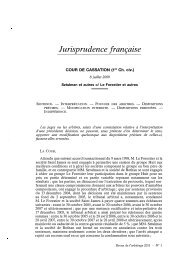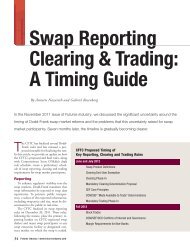What is a Broker-Dealer? - Davis Polk & Wardwell
What is a Broker-Dealer? - Davis Polk & Wardwell
What is a Broker-Dealer? - Davis Polk & Wardwell
Create successful ePaper yourself
Turn your PDF publications into a flip-book with our unique Google optimized e-Paper software.
<strong>What</strong> Is a <strong>Broker</strong>-<strong>Dealer</strong>? § 1A:4.5<br />
Also, section 716 of Dodd-Frank, the so-called “Swaps Pushout<br />
Rule,” prohibits “Federal ass<strong>is</strong>tance,” including FDIC insurance and<br />
access to the Federal Reserve’s d<strong>is</strong>count window other than as part of<br />
broad-based programs, to “swaps entities,” which include SBS dealers<br />
and SBS MSPs. Insured depository institution MSPs are not subject to<br />
the Swaps Pushout Rule. In addition, insured depository institutions<br />
are not subject to the Swaps Pushout Rule if they limit their swaps<br />
activities to hedging or mitigating the r<strong>is</strong>k of their activities or to<br />
swaps on reference assets perm<strong>is</strong>sible for investment by a national<br />
bank under 12 U.S.C. § 24 (Seventh).<br />
The Swaps Pushout Rule explicitly allows an insured depository<br />
institution to have or establ<strong>is</strong>h a swaps entity affiliate. Thus, certain<br />
activities previously permitted to be conducted in a bank may now<br />
need to be conducted in a separate affiliate. Th<strong>is</strong> affiliate will likely be<br />
required to be separately capitalized.<br />
For those activities that are not required to be ceased or pushed out<br />
of the bank by virtue of the Volcker Rule and the Swaps Pushout Rule,<br />
however, the bank exceptions for identified banking products, as<br />
defined in Section 206(b) of the Gramm-Leach-Bliley Act, from the<br />
definitions of “broker” and “dealer” (and, therefore, the exemption<br />
from broker-dealer reg<strong>is</strong>tration) remain. 316<br />
§ 1A:4.5 Security Futures<br />
The CFMA amended the Exchange Act to permit futures on single<br />
stocks and expand the definition of “security” to include certain<br />
security futures. 317 Both the Commodity Exchange Act and the<br />
Exchange Act define a “security future” as “a contract of sale for<br />
future delivery of a single security or of a narrow-based security<br />
index . . . except an exempted security under section 3(a)(12) of the<br />
[Exchange Act]. . . .” 318 The term “security future” includes only<br />
futures contracts on a single security (often called single stock<br />
futures) or those on a narrow-based security index, and does not<br />
include futures contracts on broad-based security indices and<br />
exempted securities. 319 A “security futures product” refers to a<br />
316. For certain exceptions from the definitions of “broker” and “dealer” for<br />
banks, see infra section 1A:7.4.<br />
317. See Exchange Act §§ 3(a)(10) and 3(a)(11) as amended by section 201 of the<br />
CFMA.<br />
318. Exchange Act § 3(a)(55); 7 U.S.C. § 1a(31). Section 1a(31) expressly<br />
excludes from the definition of “security future” any agreement, contract,<br />
or transaction excluded from th<strong>is</strong> chapter under sections 2(c), 2(d), 2(f), or<br />
2(g) of the CEA (as in effect on December 21, 2000) or sections 27 to 27f of<br />
the CEA.<br />
319. CEA § 1a(31).<br />
(<strong>Broker</strong>-<strong>Dealer</strong> Reg., Rel. #9, 9/10)<br />
1A–75





